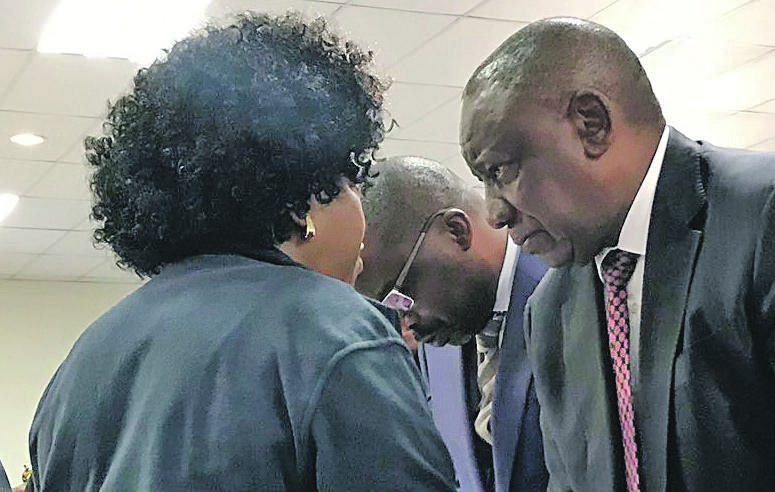
Two moments prompted this article: the discovery of seven murdered family members in Vlakfontein and the National Gender Summit that President Cyril Ramaphosa attended, where women, as major victims of gender-based violence, laid bare their scarred hearts and souls, to underscore the severity of this crime.
When Martha Marumo revealed her scarred body, it was a complex symbolic statement.
It was an affirmation of her traumatic experience, and the suffering and indelible scars that grimace at her each day.
Second, it was a bold amplification of the physicality of the crime.
Thirdly, a cry for action and restoration of her basic rights and liberties.
Fourthly, a serious indictment on the criminal justice system’s efficacy in dealing with femicide.
Fifthly, a clarion call to reframe the narrative about gender-based violence and implement effective methodologies to deal with the scourge and, finally, a subtle, yet profound admission of the citizenry’s collusion in this type of violence.
Femicide perpetrators and women bashers dine in our restaurants, shop in our malls, and live in our residential areas.
Yet we are complicit in not disclosing them to the law enforcement agencies.
Somehow, fear has paralysed our consciences. Could it be a result of that morbid thinking, “It’s their personal affair”?
When Marumo revealed her scarred body, it was a symbolic questioning of the criminal justice system’s efficacy; her scarred body the ever-present symbol of how gender-based violence has violated the basic rights of every woman across Mzansi.
At the centre of this revelation lies the question: For how long must women suffer before a lasting solution is found?
It underscores the state’s inability to decisively deal with gender-based violence. Each day, this insidious national challenge mutates, with heinous consequences.
It’s about time femicide was mainstreamed as a requisite of human rights and the continued deepening of democracy.
We must create a culture of caring which must be nurtured into a timeless national heritage.
Incidentally, Mzansi celebrates Heritage Day with reverence because of its symbolic significance.
Why can’t we do the same and create a heritage of caring, especially for women and children?
There is more to Heritage Day celebrations than the exuberant razzmatazz, argued advocate Sonwabile Mancotywa, the chief executive officer of the National Heritage Council.
In one of his insightful articles, he wrote: “Heritage all over the world plays two important roles in the modern nation state ... it serves as a unifying force, helping to construct national identity, a common purpose and shared values.”
If Mancotywa’s narrative about heritage was contextualised within how South Africa deals with gender-based violence, is it a credible action heritage? Can it be embraced inter-generationally? Is it shared by citizenry?
Responses to these questions are nuanced, depending on one’s framing of the challenge.
Evidence gleaned from literature and the deliberations at the gender summit show that gender-based violence is legitimised through social and cultural praxis that undermines citizens’ human rights and other liberties.
For instance, the BaSotho have this weird narrative that “Mosadi ha ngale”, loosely translated to “A woman (wife) does not abandon the homestead, regardless of the circumstance”.
It is these social constructs that have resulted in the heinous acts of violence against Marumo and others.
As the narrative goes, they must just “kgotlelela” – bear the brunt of gender-based violence.
It is this savage philosophy that must be erased from social and cultural practices.
We need efficient application of the laws of the country and robust commitment to the espousal of ubuntu and co-existence.
Only when the citizenry is active can the complete institutionalisation of women’s issues be attained and sustained.
Gender-based crimes are recognised as a manifestation of gender inequality. South Africa espouses the principle of equality.
Crimes of this nature can be addressed through robust and well-coordinated strategies that include and are not limited to the following:
. Prioritising femicide/gender-based crimes as a national challenge;
. Creating efficacious criminal justice systems and processes anchored on meticulous police intelligence, robust crime investigation and timeous prosecution and sentencing;
. Creating robust data collection methodologies;
. Creating a national data portal for easy access across provinces and regions;
. Scaling up crime monitoring systems using existing policy registries for impactful prosecutions;
. Investing in robust research that will be a game-changer on dealing with femicide;
. Robust retraining and professional development of law enforcement agency personnel to utilise the latest technologies to resolve complex crimes;
. Creating crime awareness nodes that promote efficacious partnerships between law enforcement agencies and communities;
. Creating efficacious support structures and facilities for post-trauma management and support of affected victims; and
. Political will and commitment as a non-negotiable virtue for accountable governance.
The suggested strategies only work in environments where law enforcement agencies and communities work in tandem to solve community challenges and deepen social responsibility.
. Monyooe is a concerned citizen
TALK TO US
What suggestions do you have for eradicating violence against women in South Africa?
SMS us on 35697 using the keyword WOMEN and tell us what you think. Please include your name and province. SMSes cost R1.50. By participating, you agree to receive occasional marketing material




 Publications
Publications
 Partners
Partners








